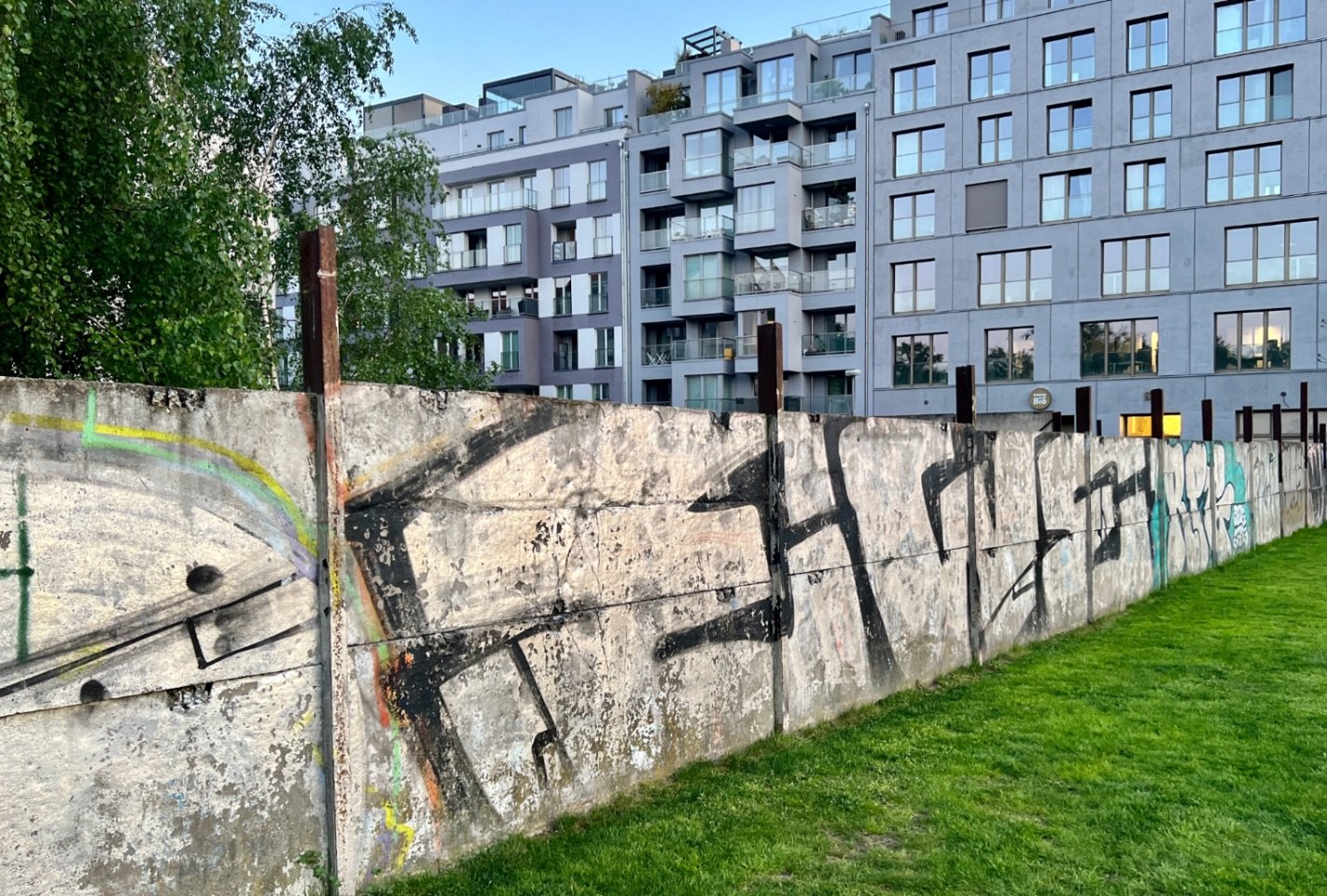Day 593 Garmisch-Partenkirchen to Berlin
The Train to Berlin
Remnants of the Berlin Wall
Garmisch-Partenkirchen - 60º
The morning of May 12, the rain finally broke, but we were already at our train station preparing to board for Berlin via Munich.
The scramble of humanity making the transition from our Munich train to the one in Berlin was harrowing and a story for a different time. We succeeded, along with hundreds of others, that was the important thing.
Once on board, the train makes haste. It's the high speed variety, and in Germany that means covering the planet at a good 150 mph. We close the distance between the two cities in 4 1/2 hours; 350 miles with seven stops.
This part of the journey reveals the more industrial side of the world's fourth largest economy, and the power that drives much of Europe. Everywhere we see factories, trains, loaded with hundreds of new automobiles and piles of cargo in containers, stacked and ready for departure on more trains. Sprawling farms are also part of the picture and every few miles, I see one small farm village after another; a cluster of buildings with a church, always a church, and its steeple rising up like an index finger saying "I am here!"
There are more carpets of canola flowers too, brilliant yellow against green clusters of trees, and far behind them a forest of towering wind turbines. You see these and solar panels throughout the country. It's one of the worlds cleaner nations and has reduced carbon emissions 40% below 1990 levels. Not that that's enough, but Germany is doing better the most of the world's nations.
Arriving in Berlin - 70° - 6:03 PM
Berlin is a big city, one of Europe's great capitals, and it has that feel. The Bahnhof (train station) is at least four stories of trains, tracks, stores, restaurants and hustling, determined travelers. It sprawls across hundreds of thousands of square feet and my mind returns to the train stations of Madrid, Paris, Santiago and Vigo.
Berliners seem to love bikes as much as trains, we found them by the acre everywhere. We bypassed them on our way to our hotel, dropped our bags and grabbed a bite before walking the mile and a half to the Berlin Wall Memorial. We only have one night in Berlin because we need to make the train that will get us to Copenhagen and then Oslo for our flight back to refuel, deal with business and visit Nana (Cyndy's mom) in Pittsburgh.
I recalled my days as a kid when the Soviet controlled nation of East Germany built the Berlin Wall in the 1960s, cutting the two parts of the same country from itself, its friends, relations and families.
So many people migrated from East to West after World War II that the Soviet controlled state built the wall to stop them. Mostly it worked, but some still attempted the crossing and more than 100 died trying, most shot by East German guards at the border; some at the very spot where we now stood.
The Wall was a horrifying example of political suppression. I felt a sadness for Germany. Its people have been through so much. We think of Europe as stable and united; old in our North American terms. Historically this is true. But politically in many ways, the United States has been fixed longer than Europe. Germany did not exist as a nation until the 1870s. It suffered through wars and uprisings in 1871 (France), 1914 (World War I), 1939 (World War II) and was not fully reunited after World War II until 1989 when the Soviet Union collapsed and the Wall came down. It was such a powerful symbol of freedom and I remembered that Molly, my oldest daughter was in the womb at the time. "You'll be entering a finer world," I remember whispering to her. But it turns out not to be that simple.
Seeing Dachau and the wall, imagining what life must've been like for those millions, it's hard to think about the pain and devastation the German people have faced.
Thankfully, it turned away from Nazism, but equally thankfully it has owned up to its terrors. When the wall and Soviet Union collapsed, Western Germany embraced its other half. There was no debate about it, even though the East was large and battered. It did it all without and ounce of rancor.
Germany is not perfect, but the transition to reunification was made with such speed and fairness. And since absorbing East Germany, and more recently, tens of thousands of Syrians, Ukrainians, and other immigrants with open arms, the country seemed to have only grown healthier; a reaffirmation that (as we have learned in the United States) there is strength in diversity, as painful as the transitions can sometimes be.
Cyn and I stood where the wall had once stood and looked at the places where people had been shot in cold blood just because they wanted to be free. The remnants of the wall reveal the brutality and ugliness of suppression.
As I stood and looked at its remnants, that's what I wanted to remember. That this kind of repression is possible, and that means freedom must be fought for; it requires vigilance, facts, truth and courage, not lies, not sleight of hand, and not blind allegiance to any leader.
The evening is cool and breezy. Cyclists are everywhere and pedestrians walk the big broad streets, nonchalantly, completely at ease. In some ways you'd never know a wall had existed.
We walked back to our hotel, hopeful.










